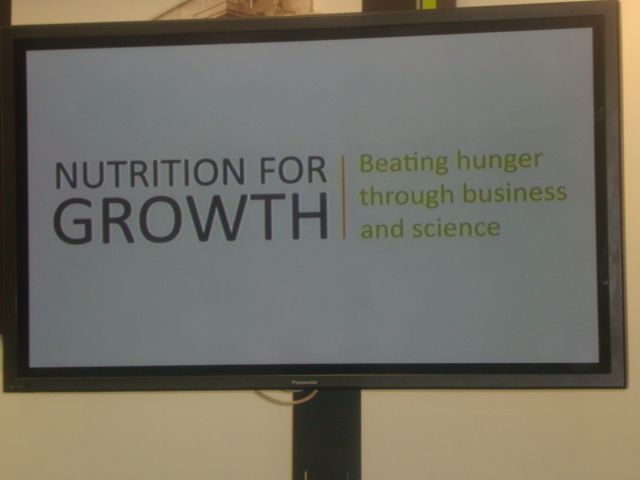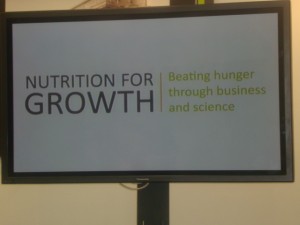This blog has been written by Fadhili Maghiya, a member of the Tanzanian Diaspora in the UK. He works for the Sub Sahara Advisory Panel (SSAP) in Cardiff, Wales.
The IF Campaign has stumped its authority on the global world and especially on those involved in the G8 summit. Mind boggling statistics were mentioned; Under-nutrition is the cause of 800 deaths every day, it stunts the growth of children contributing to 11% economy deficit in some countries. 1 in 4 (167 million to be exact) children in the world, under 5 years old are stunted, 27% are born malnourished, 50% of children’s death are because of it etc. Pledges and commitments were made and £2.7 billion has been secured to tackle under-nutrition[1]. £1.9 Billion is core funding and the rest is match fund. The UK has committed an additional £375 of core funding and £280m matched funding from 2013 to 2020[2]. As David Cameron put it blatantly, the UK’s tax payers’ contribution is a mere 0.7% of the country’s GDP, “For every £1 you pay in tax, just over 1 penny goes towards our aid budget. That’s a good investment.”[3]
Under the banners, ‘Beating Hunger Through Business and Science’ and ‘Enough Food For Everyone IF‘, the campaign appealed to business and G8 country members to take notice and be the driving force to ensure that at least 500 million women and children are reached with effective nutrition interventions; to reduce the number of children under five stunted by at least 20 million and to save the lives of at least 1.7 million children under 5 by preventing stunting, increasing breastfeeding, and increasing treatment of severe acute malnutrition. It was agreed that the £2.1 Billion pledged by these stakeholders will be spent on making world-class scientific knowledge and evidence available, promote breastfeeding as a priority for protecting nutrition and saving lives, support governments of developing countries to formulate high quality national nutrition plans and ensure businesses in developing countries place good nutrition at the heart of their workforce welfare priorities.
Malnutrition is the result of a diet that doesn’t contain enough nutrients and under-nutrition is the lack of food or nutritional deficiency. Developing countries still suffer from such endemic diseases due to poor health facilities, poor health support, education as well as government’s failures to deal with the issues. Causes of malnutrition are cross wide and whilst the problem is chronic in many countries e.g. 47% of Malawian children are stunted[4], not much has been done to tackle it as issues such as poverty and HIV were seen to be critical. With only 0.4% of current aid spent on tackling malnutrition, the global international community and businesses are responsible to ensure that this single large contributor of child mortality is eradicated as it underlies 45% or 3.1 million child deaths a year[5].
How do we tackle such issues?
David Cameron and other stakeholders dutifully acknowledge the importance of tackling the issue of malnutrition and nutrition in general. The issue has never been at the front page of many previous development initiatives….till now. During his speech, the Prime Minister highlighted one key issue which stood out the most, statistics are important BUT the people behind the statistics are more important. Malnutrition is a health, economic and education issue which affects all across the World…it is a massive issue for humanity and tackling it will encompass a combination of different approaches.
The message from the campaign is that we can end global hunger if the G8 and other stakeholders can work together in partnership to increase investment, improve transparency, accountability and governance of key aspects of the food system. These issues can be tackled through 8 main challenges; Tax Transparency, Nutrition, Land Transparency, Biofuels, Agricultural Investment, Budget Transparency, Climate Change and Accountability. These are ways of tackling the issue from a top-down approach. From a bottom – up approach, malnutrition can be tackled in many ways…through educating and empowering communities, developing better governing and monitoring strategies.
The message put across by the IF Campaign is that business should play a greater and effective role in tackling malnutrition. This can be through investing in research, innovative products, business approaches, as well as collaboration with government states. The idea of involving businesses to tackle the issue can be seen as a double edged sword and one which is crucial but should be handled delicately. There has to be checks and balances to monitor and assess their contribution. Business are profit driven and despite initiatives such as Corporate Social Responsibility (CSR), many companies do not adhere to the ethical values of the platform. Tax avoidance, land grabbing, corruption and lack of effective government policies to name a few, represents some of the problems arising from allowing private investors into developing states. Land grabbing and displacements of local indigenous communities are deemed prominent in the last few years. Furthermore empty promises for jobs, building infrastructures and social services by businesses exasperate the problem. In a twisted format, business can also be seen as the cause of malnutrition as displaced individuals are left jobless, landless, hopeless and foodless. There will be no hope for children to survive malnutrition related diseases if these issues are not tackled.
To sum it up, businesses can help eradicate malnutrition but there has to be nutrition justice, nutrition fairness and nutrition equality. I agree with David Cameron that through harnessing the power of enterprise and science and innovation, business can play a crucial role in combating malnutrition. However, effective government policies as well as monitoring and evaluation systems are just as important.
[1] https://www.gov.uk/government/uploads/system/uploads/attachment_data/file/205887/Global-Nutrition-for-Growth-Compact-Final.pdf
[2] UKaid Press Release (08 June 2013)
[4] http://web.undp.org/africa/knowledge/WP-2012-019-garcia-working-afhdr-malnutrition-inequalities.pdf
[5] https://www.gov.uk/government/uploads/system/uploads/attachment_data/file/205887/Global-Nutrition-for-Growth-Compact-Final.pdf
Fadhili Maghiya is a member of the Tanzanian Diaspora in the UK. He is currently working for the Sub Sahara Advisory Panel (SSAP) in Cardiff, Wales. Following an MA in Human Rights and a BA in Social Sciences, he interned for a number of development organisations locally and internationally. This included working as a legal intern for the United Nation International Criminal Tribunal for Rwanda (UNICTR), the Royal African Society and Film Africa 2012. He is passionate about African Diaspora issues, international development and global political affairs.





No Comments to "IF CAMPAIGN, BUSINESS AND MALNUTRITION"